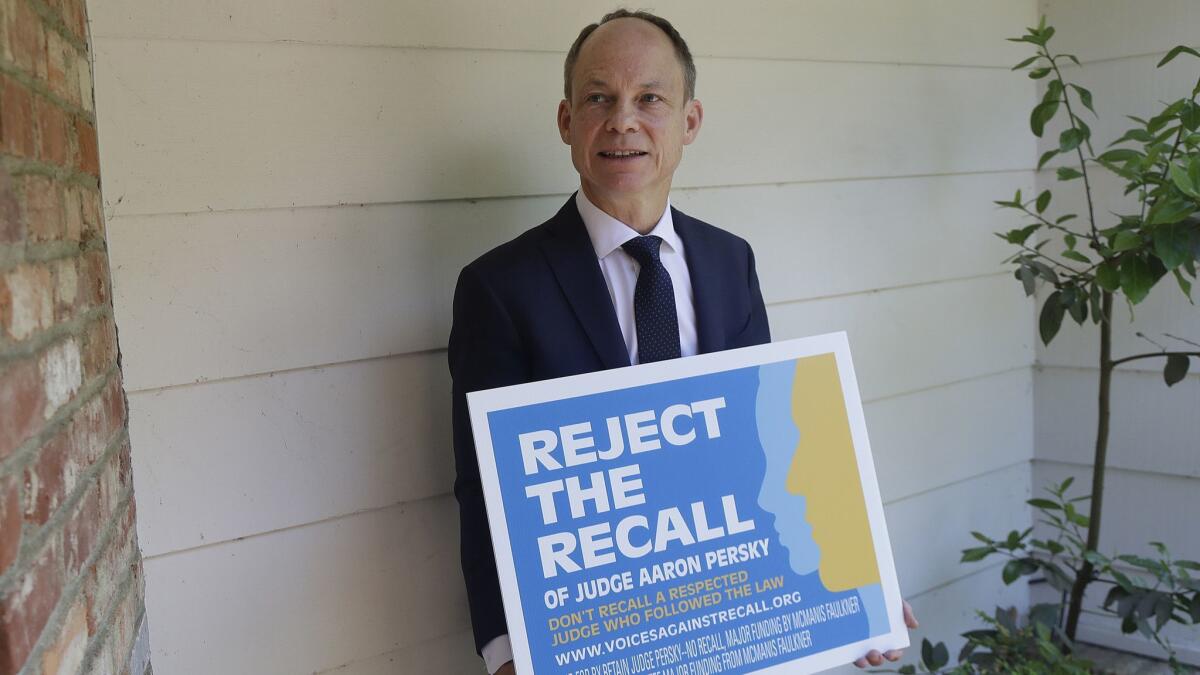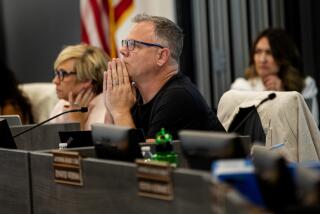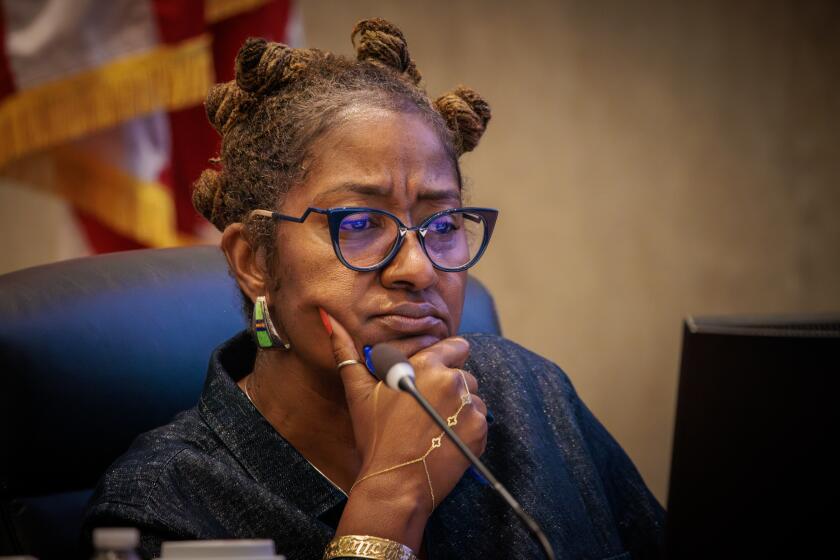The judge who sentenced Brock Turner to six months in Stanford rape case is fighting a recall

Reporting from Mountain View, Calif. — Judge Aaron Persky says he has no regrets.
The Northern California judge says he would handle the sexual assault case of former Stanford University swimmer Brock Turner the same way today as he did almost two years ago, though it’s the reason he is the target of a June 5 recall election and has become the self-described “most hated man on the internet.”
In an interview, the 56-year-old Persky argued that the Santa Clara County recall effort was “fundamentally unfair” because it reduces a complicated criminal case to a litany of inflammatory Twitter hashtags. He even got a little teary-eyed as he protested being turned into a one-dimensional caricature of the judge who condones rape.
“I expected some negative reaction,” Persky said. “But not this.”
The recall effort comes amid the growing influence of the #MeToo movement, and observers say it will serve as a bellwether of the movement’s influence on national politics.
Persky says he has resisted friends’ calls to quit and relieve the mounting pressure on his wife and two young sons because judicial independence is at stake. Recalling judges over unpopular rulings threatens the integrity of the judiciary, he said.
“To get justice from a judge, they need someone who follows the rules. The basic rule is the rule of law,” he said. “The problem with this recall is it will pressure judges to follow the rule of public opinion as opposed to the rule of law.”
On June 2, 2016, Persky followed the county probation department’s recommendation when he sentenced Turner to six months in jail for sexually assaulting an unconscious woman known in court records as Emily Doe. Turner is also required to register for life as a sex offender.
In court, the victim read an emotional statement recounting the assault, her treatment by investigators and the ordeal of facing questions about her sexual activity and drinking habits. It quickly went viral.
“Instead of taking time to heal, I was taking time to recall the night in excruciating detail, in order to prepare for the attorney’s questions that would be invasive, aggressive and designed to steer me off course, to contradict myself, my sister, phrased in ways to manipulate my answers,” she wrote. “This was a game of strategy, as if I could be tricked out of my own worth.”
Persky declined to discuss Doe’s statement or other details of the case because it’s on appeal. Generally, he said, California law requires him to take into account the victim’s statement.
Turner is appealing his jury conviction, arguing he didn’t get a fair trial because character witnesses were barred from testifying about his honesty, scholastic success and his swimming career. Oral arguments are scheduled for June 28 in San Jose.
Persky also declined to elaborate on his reasoning for Turner’s sentence, which was widely criticized as too lenient.
Stanford University law professor Michele Dauber is one of the leaders of the recall campaign. Dauber is a friend of the victim’s and was in the courtroom for Turner’s sentencing. She’s an outspoken on-campus activist who has helped push through more stringent sexual harassment and abuse reporting and investigation policies.
Dauber also is an adept Democratic fundraiser who has organized a well-financed recall campaign with glossy mailers juxtaposing photos of Persky with President Trump and Turner’s booking mug shot.
“We feel it’s important to respond strongly with a message of accountability for elected officials like Judge Persky who do not take sex crimes and violence against women seriously,” Dauber said. “Many eyes around the country are going to be on Santa Clara County as a model for how to respond to bias against women in the legal system.”
Dauber said Persky’s position takes a “dim view of judicial integrity” and that she has faith judges will continue to exercise their independence regardless of the outcome.
The recall campaign has drawn outsize attention and money for a local race: Proponents have raised about $1.2 million, and the judge about half that much.
“Recall Persky” signs dot the immaculate lawns of multimillion-dollar homes in Persky’s Silicon Valley neighborhood, where the judge removed the numbers from the front of his house after a popular website published his address. Some former friends have told him they’re voting for his recall.
Persky earned his law degree from UC Berkeley. In 1997, the Santa Clara County district attorney’s office hired him as a prosecutor, and Gov. Gray Davis appointed Persky to the bench a month before voters recalled Davis from office in October 2003.
A number of law school professors and retired judges have sided with Persky, including Santa Clara County Dist. Atty. Jeff Rosen, who called Turner’s sentence too lenient but “lawful.” Rosen agreed with Perksy that the recall threatens judges’ willingness to make correct but unpopular rulings.
“This value is more important than any outcome in any individual case,” he said.
More to Read
Sign up for Essential California
The most important California stories and recommendations in your inbox every morning.
You may occasionally receive promotional content from the Los Angeles Times.










